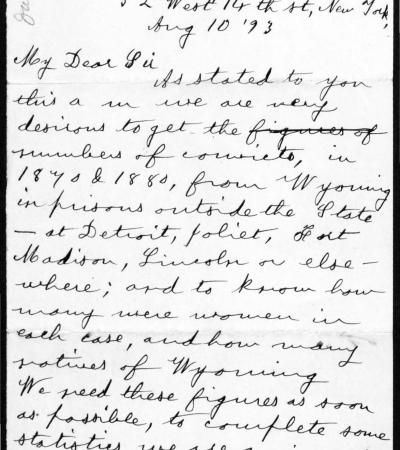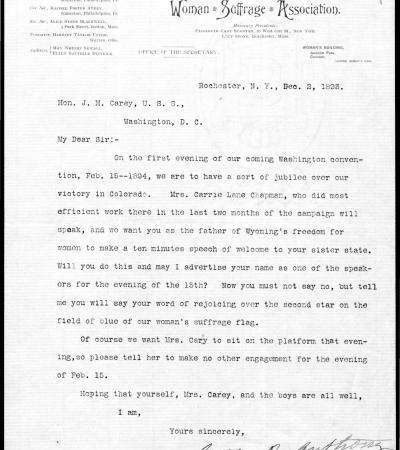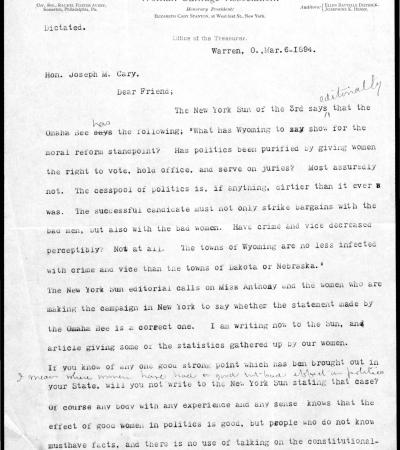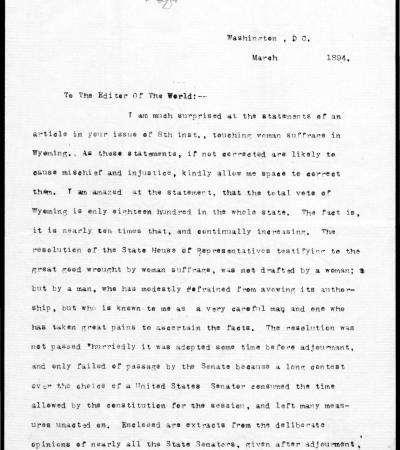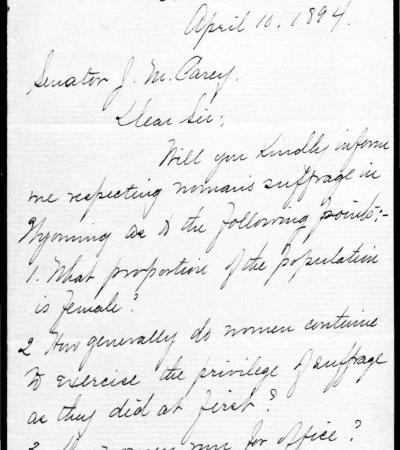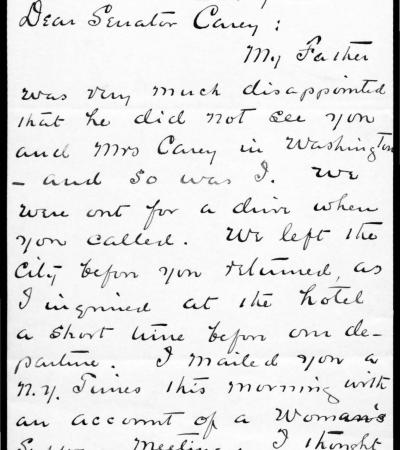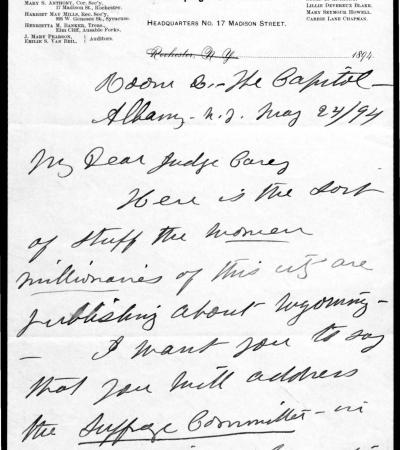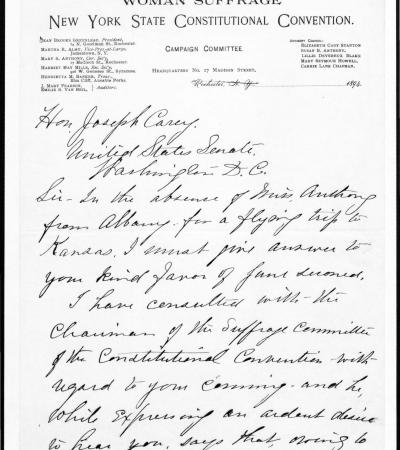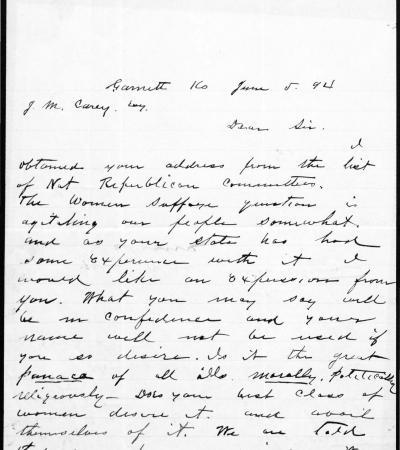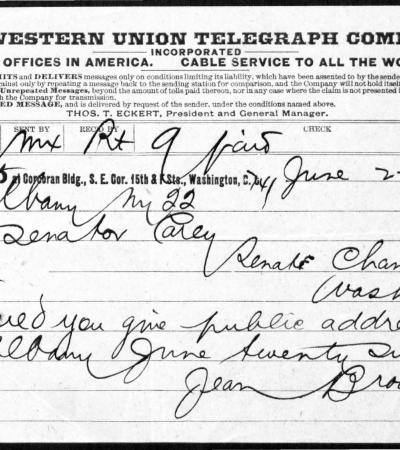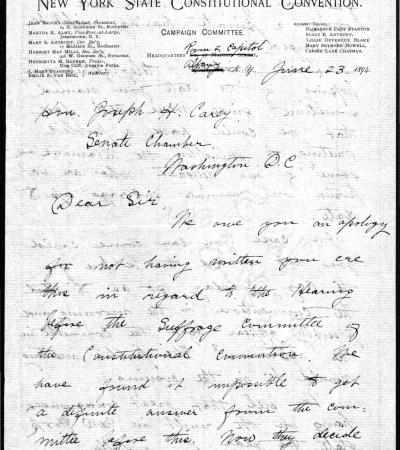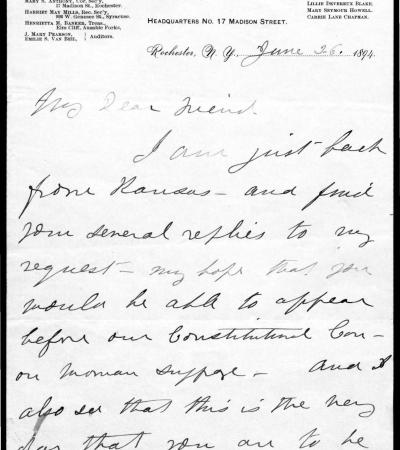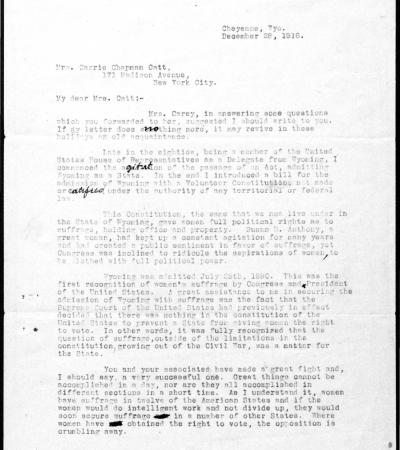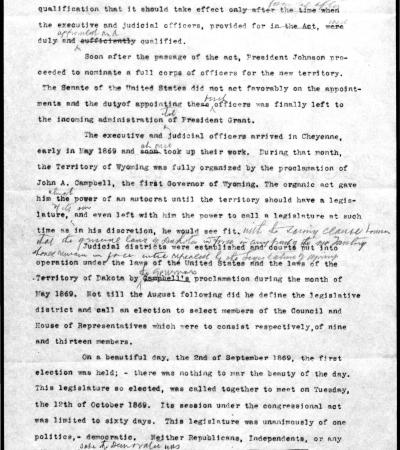Joseph M. Carey was born in Milton, Delaware, on January 19, 1845. His family were well established merchants and thus could provide Joseph with an excellent education. After two years of college, Carey went to the University of Pennsylvania and obtained a law degree in 1867. Carey was interested in politics from a young age and worked vigorously to elect Ulysses S. Grant as U.S. President in 1868. President Grant rewarded the ambitious young man with the appointment of U.S. District Attorney for Wyoming Territory. Carey’s diligent work earned notice and soon he became the U.S. Associate Justice to the Supreme Court of Wyoming. Carey kept the title of judge for the rest of his life despite all the other positions he held in his lifetime.
As the delegate to the U.S. Congress for the Wyoming Territory, Carey authored the bill to admit Wyoming to statehood and fought valiantly for its passage. He defended ardently and successfully the clause in the state’s constitution that conferred suffrage on women. Legend has it that Carey and the Wyoming delegation told Congress that “Wyoming would wait 100 years for statehood rather than join without women’s suffrage.” The legislation was signed into law on July 10, 1890, and Carey was given the honor of sending the telegram to acting governor John W. Meldrum declaring the victory. Carey was rewarded for his efforts by being elected the first U.S. Senator from Wyoming on November 12, 1890. He served as U.S. Senator from December 1, 1890, to March 3, 1895.
Carey was a sought-after speaker by the national women’s suffrage movement due to his support for suffrage and his leadership in effecting Wyoming as the first state or territory in the nation to grant suffrage to women on equal footing with men. Carey was invited by national suffragists to speak at the State of New York’s 1894 convention when a suffrage amendment to the state’s Constitution was under consideration. Although Carey and others spoke in favor, the amendment ultimately failed. He returned to Wyoming from Washington, D.C. in 1894 and in 1910 was elected Governor for the 1911-1915 term. During his term as governor from 1911 to 1915. He died February 5, 1924, in Cheyenne, Wyoming.
Letter from Hamilton Willcox to U.S. Senator Joseph M. Carey, August 10, 1893
Male suffragists also played a part in the women’s suffrage movement. According to Wyoming historian T.A. Larson, veteran Indiana suffragist George W. Julian began a chain reaction when he introduced a bill in the U.S. Congress in December 1868 to give women the right to vote in all territories. New York suffragist Hamilton Willcox drew much public attention when he testified in a committee hearing that Julian’s bill would attract women to the territories. Although Julian’s bill died in committee, Edward M. Lee of Connecticut had taken note of the attract-women argument.
Letter from Susan B. Anthony to U.S. Senator Joseph M. Carey, December 2, 1893
Colorado women secured voting rights by state referendum on November 7, 1893, becoming the first state to enact women's suffrage by popular referendum. Prominent national suffragist Susan B. Anthony's asks Carey to speak at NAWSA's upcoming convention due to Wyoming role as a women's suffrage leader in the nation. Anthony mentions Carrie Chapman Catt's suffrage work in Colorado.
Letter from Harriet Taylor Upton to U.S. Senator Joseph M. Carey, March 6, 1894
Upton, a key national women's suffrage organizer, writes to Carey requesting he refute a newspaper story declaring women's suffrage has not been been a success. Upton asks Carey, "If you know of any good strong point which has been brought out in (I mean where women have had a good not-bad effect in politics) your State, will you not write to the New York Sun stating that case?"
Draft of letter from U.S. Senator Joseph M. Carey to the Editor of the World, March 1894
Carey writes to editors of the New York World refuting claims in their article dated March 8, 1894, disparaging women's suffrage using Wyoming as a case in point. It wasn't until 1917 when, after a massive campaign by suffragists, New York voters passed an amendment to the New York State Constitution granting women full suffrage.
Letter from Mrs. Orlin O. Fletcher to U.S. Senator Joseph M. Carey, April 10, 1894
Mrs. Fletcher asks Carey specific questions regarding women's suffrage in Wyoming. She notes that she is not a supporter of women's suffrage. She is the wife of Rev. Dr. Orlin O. Fletcher, a Baptist minister who later became an educator at Furman University in Greenville, South Carolina. Transcription included.
Letter from Charles Whipple to U.S. Senator Joseph M. Carey, April 25, 1894
Charles Whipple writes of his and his father's regret at not seeing the Careys when they called. He notes that "…Mrs. Whipple was still true to her Wyoming training. They were anxious to see a woman who had voted, so she exhibited herself and made a speech." Transcription included
Letter from Susan B. Anthony to U.S. Senator Joseph M. Carey, May 24, 1894
Due to Wyoming's lead role in women's suffrage and Carey's support of the same, Anthony writes to ask him to deliver a speech to a committee in charge of a women's suffrage amendment at the 1894 New York State Constitutional Convention. Her letter also mentions U.S. Rep. Thomas Brackett Reed of Maine, an active supporter of women's suffrage upon whom Susan B. Anthony had relied since 1887. Transcription included.
Letter from Jean Brooks Greenleaf to U.S. Senator Joseph M. Carey, June 1894
Greenleaf, president of the New York State Woman Suffrage Association, responds to Carey in place of Susan B. Anthony who went to Kansas to further women's suffrage there. Greenleaf is arranging for Carey to speak in favor of women's suffrage to the suffrage committee at the New York State Constitutional Convention, although Carey's suggested date may be too late for the committee's public hearings. Transcription included.
Letter from E. H. Voorhees to U.S. Senator Joseph M. Carey, June 5, 1894
E. H. Voorhees writes from Garnett, Kansas, to ask Carey questions regarding women's suffrage in Wyoming. At the time Kansas suffragists were organizing prior to a vote on a women's suffrage amendment to occur on November 6, 1894. The amendment was defeated. Transcription included.
Telegram from Jean Brooks Greenleaf to U.S. Senator Joseph M. Carey, June 22, 1894
Greenleaf continues to negotiate with Carey regarding when he can speak before the suffrage committee at the New York State Constitutional Convention. Telegram reads: Could you give public address Albany June twenty sixth.
Letter from Jean Brooks Greenleaf to U.S. Senator Joseph M. Carey, June 23, 1894
Greenleaf urges Carey to confirm a date to speak before the suffrage committee at the New York State Constitutional Convention, noting that the committee will soon close public hearings. She references her telegram of June 22 asking if June 26 would work for him. Two days later, June 28, 1894, Carey did speak before the committee the final hearing. At the end of the hearings, the suffrage committee wrote a report opposing the women’s suffrage amendment. Discussion on this report, held from August 8 through 14, 1894, was attended by large numbers of suffragists.
Letter from Susan B. Anthony to U.S. Senator Joseph M. Carey, June 26, 1894
Susan B. Anthony expresses her frustration with male legislators who she believes are politicizing women's suffrage, using events in Kansas an example. The desire to have Carey speak to the suffrage committee is evidenced by still another request by Anthony. Anthony references suffragists Harriet May Mills, Isabel Howland, and Kansas suffragist Jane "Jennie" Slocum.
Letter from Joseph M. Carey to Carrie Chapman Catt, December 28, 1916
Carey describes to prominent suffragist Carrie Chapman Catt his involvement in women's suffrage efforts over the years, voices his support for suffrage, explains his view of current national climate on suffrage, and expresses his disagreement with the current strategy by suffragists to gain federal ratification. Carey mentions the Hughes Alliance. President Woodrow Wilson opposed women's suffrage on the federal level.
Letter from Joseph M. Carey to Carrie Chapman Catt, December 28, 1916
Speech regarding the history of women's suffrage in Wyoming for a plaque commemorating passage of women's suffrage in the state in 1869. The plaque was placed on the building where the women's suffrage bill was introduced and passed by the first Wyoming legislature.
